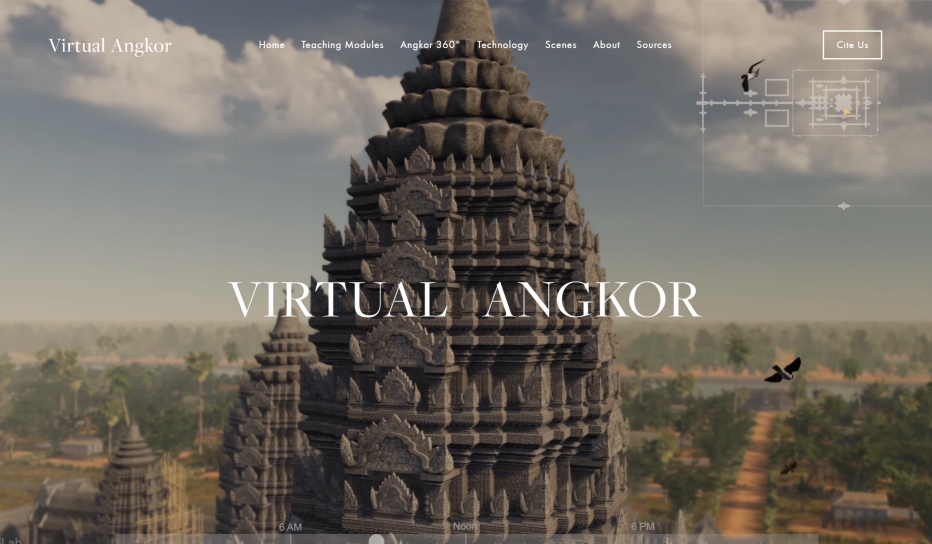Kirschenbaum’s article plays with this idea of an inserted importance on future generations’ literacy in computer languages and urges others to see the advantages of additional knowledge in technology. While I certainly don’t agree with using a computer language as a replacement to learn more traditional forms of languages, I do believe in his claim […]
Month: January 2020
To be blunt, I think everyone should learn how to code regardless of whether or not they are humanities scholars. Not learning to code because it is daunting or inaccessible is a terrible excuse; in the advent of online communities, forums, and educational sites, you can easily learn how to code for free on your […]
The value of coding for humanities
“Virtual worlds will be to the new century what cinema was to the last one and the novel to the century before that.” Kirschenbaum, Matthew G. “Hello Worlds (Why Humanities Students Should Learn to Program).” WordPress, 23 May 2010, mkirschenbaum.wordpress.com/2010/05/23/hello-worlds/. As a prospective CS major, I don’t believe it is very surprising that I agree with […]
Symbiosis
Whereas a “fluency” in programming languages should not be required or expected of humanities students, I believe that a basic familiarity with how computer science works and the limits and abilities of the programmer is important for anyone to know today. As the world becomes more technological, it is more and more likely that people […]
My first “web page”
I’ve always run from the smallest computer problems, and coding has been no exception. I panic nearly every time I accidentally open a web page’s code and quickly look for the little “x” in the top right corner. I think that as technology becomes more ingrained in our everyday lives, it is necessary to try […]
” Programming is about choices and constraints, and about how you choose to model some select slice of the world around you in the formal environment of a computer. “ Kirschenbaum, G. Matthew, “Hello Worlds (why humanities students should learn to program) ” . May 23, 2010 . Accessed Jan 19, 2020: https://mkirschenbaum.wordpress.com/2010/05/23/hello-worlds/ Coming from a […]
Why I’m Taking CS111
The title goes a long way to describing my intentions with this post, I want to explain why it is I’m taking CS:111 Intro to Computer Science as a junior history major. As we’ve been discussing the relative merits of humanities students learning to code, I’ve been reflecting on my own choices this term, and […]
Part I: I’m not a fan I have a lot of thoughts and feelings about Kirschenbaum’s article and the vast majority of them have to do with the fact that he comes off as a self-congratulatory shithead with an abhorrent writing style. His article comes off as wordy and pretentious and if it weren’t for […]
Reverse Engineering Viral Texts
Viral Texts is a website that consists of many different types of digital humanities projects including data, visualizations, network graphs, interactive exhibits, and computational and literary publications. Newspaper editors used to cut up other newspapers and paste together fictional stories, poems, news, jokes, and religious affirmations among other things. The goal of this website is […]
Rebuild FabricSpace
I discovered this really cool digital humanities project called FabricSpace. I found it as a blog post / article on the Digital Humanities page of Yale University library. Here’s a link to it: http://dh.library.yale.edu/projects/vogue/fabricspace/. The main goal of this project is to generate clusters of fabrics based on each fabric’s context of appearance in Vogue […]

The project I chose to explore is called Virtual Angkor. The project revolves around the 3D recreation of the city of Angkor and the elements that helped the city flourish. The project is clearly oriented towards education and using 3D technology to enhance that education. The goal of Virtual Angkor is to create a 3D […]
http://dh.library.yale.edu/projects/vogue/ Sources looked through Robots Reading Vogue project, which takes advantage of the vast abundance of Vogue magazines which had already been digitized through a collaboration with ProQuest and Condé Nast, the mass media company. Choosing Vogue was a strategic decision: few other magazines have consistently been published for over a century while also continuing […]
For this most recent assignment, I decided to write my “deconstruction” of a Digital Humanities project on a virtual version of Angkor Wat, the largest religious monument in the world and located in Cambodia (you can access the project here). The temple complex was built in the 12th century in what is now northwest Cambodia […]

Few things are so quickly dated and so obscure to outsiders in literature as references to place. A neighborhood nickname, a locally notorious alley, may be rich in meaning as Dickens writes them, but utterly baffle readers a mere generation later or a country distant. Authorial London: About The Authorial London project is a compilation […]
Medieval Clothing
The Lexis of Cloth and Clothing Project, found through the Medieval Resources website, is a helpful source for those wishing to explore the clothes of Britain from c. 700-1450. The site contains a vast, searchable database of medieval clothes along with with the terminology of the textiles. Sources The website has a great amount of […]
Digitized Cartography
I selected the “Mappa Mundi” Project, a digital humanities effort by Hereford Cathedral in the United Kingdom to provide access and information on the Mappa Mundi, one of the cathedral’s treasured possessions. The project displays an interactive visual representation of the map, containing thumbprint icons on spots that the research team has identified as being […]
If You Give a Robot the Vogue…
It’ll probably learn to read it. The project I had explored was titled “Robots Reading Vogue,” conducted at Yale University in 2014. From topic modeling to color analysis, the whole project contains many different components that utilize the given data in various ways. I was specifically interested in the n-gram search, which was accessible from […]
Georgetown University, once rooted in slavery, created a website which shows a genealogy of descendants of the 272 African American slaves sold in 1838 for the benefit of the Jesuit college (the predecessor of Georgetown University). The Georgetown Slavery Archive presents relative material about the Maryland Jesuits, Georgetown University, and slavery. This project was started […]
The Georgetown Slavery Archive offers a unique lens in studying the emotional, mercantile, and political environment in regards to slavery of 19th century Georgetown University and the Maryland Jesuits. The site documents a plethora of written resources to illustrate how perspectives on slavery varied during that era in a college environment. In essence, the Georgetown […]
Virtual Angkor
Virtual Angkor is a digital humanities project that aims to teach users about thirteenth century Angkor by using a combination of educational posts and 3D replications of the city. The sources for the project are numerous papers written by various historical figures and contemporary scholars. The website cites the Chinese historian Zhou Daguan’s A History […]
Visualizing Angkor
Having not known much about Angkor at all, I was pleasantly surprised when I stumbled upon the digital humanities project Virtual Angkor 360 ( https://www.virtualangkor.com/ ), a sprawling three-sixty degree computer-generated visualization of ancient Angkor. The project is spearheaded by an assortment of different teams and groups; the visualization itself is done by Sensilab, while […]
…the cultural primacy of making, especially in tech culture—that it is intrinsically superior to not-making, to repair, analysis, and especially caregiving— Chachra, Debbie. “Why I Am Not a Maker.” The Atlantic, Atlantic Media Company, 23 Jan. 2015, www.theatlantic.com/technology/archive/2015/01/why-i-am-not-a-maker/384767/. This part taken from “Why I Am Not A Maker” caught me off guard because it made me […]

Overview While travelling in the crowded metro buses of the French capital, Paris, I realized just how popular alternatives to paper-books have become. Ebooks and Audiobooks with their economy of space and almost-instant accessibility have proven to provide a practicality and efficiency that was not possible beforehand. Thinking about how inconvenient it has become to […]
Francis Bacon, esteemed Elizabethan philosopher, father of empiricism, and notorious pain in my rear during my 10th grade AP European History class, undoubtedly left his legacy in history. However, his place in early modern British society — particularly within his connections to other notable figures of the era— serves as the lens through which anyone […]
Angkor Wat, one of the most recognizable Hindu temples and the largest religious monument in the world. In this blog post, I explored the various aspects of a website that has constructed a 3D virtual Angkor Wat. The website was not intended to argue but as a learning tool for students who are interested in […]
An Examination of Virtual Angkor
For this blog post, I explored the Virtual Angkor educational website. This website simulated 24 hours at medieval Angkor Wat, recreating a virtual rendition of what life at the Hindu temple Angkor Wat in Cambodia would have looked like. This project was a collaborative effort between historians, archaeologists, and virtual history specialists to bring a […]
Virtual Angkor – Reverse Engineered
Virtual Angkor is a groundbreaking collaboration between Virtual History Specialists, Archaeologists and Historians designed to bring the Cambodian metropolis of Angkor to life. Built for the classroom, it has been created to take students into a 3D world and to use this simulation to ask questions about Angkor’s place in larger networks of trade and […]
Exploring Literary London
Released by Stanford University, Authorial London provides a publicly accessible platform for the public to explore and compare literary references to authors, places, and works within today’s Greater London area. Authorial London presents geographical references from the literary works and lives of 14th to 20th century authors. The first type of data point is biographical […]
Virtual Angkor is the result of the collaboration between Archaeologists, Historians, and Virtual History Specialists, likely in the spirit of scholarly collaboration under the wings of SensiLab at Monash University in Australia. Targeted towards educators, it was created to unfurl the Cambodian metropolis of Angkor before the eyes of students, it’s a three-dimensional world that […]
Six Degrees of Francis Bacon is a project that seeks to map the social network of the the titular figure and those around him. Given the many roles Bacon served during his life, this project contributes to conversations that could be held in historical, literary, political, and philosophical disciplines. The project is openly collaborative, inviting […]